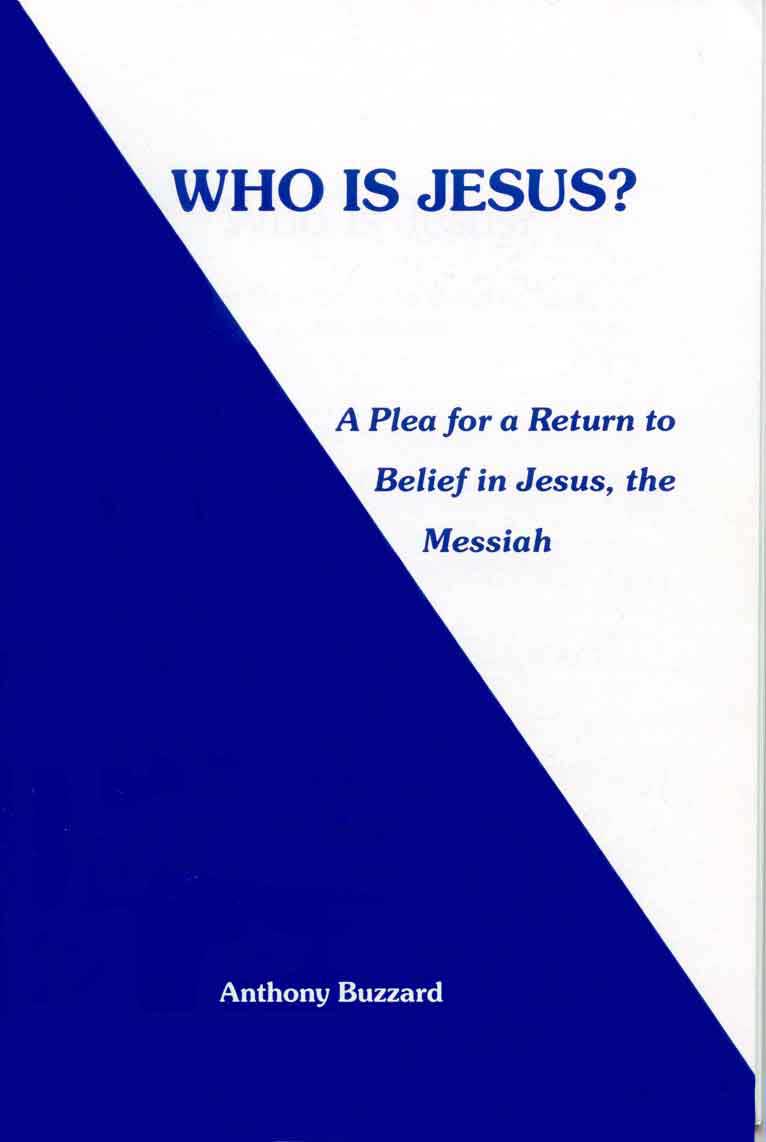 Who Is Jesus? A Plea for a Return to Belief in Jesus the Messiah
Who Is Jesus? A Plea for a Return to Belief in Jesus the Messiah
by Sir Anthony Buzzard
paperback booklet, 40 pages
1986: Restoration Fellowship
It is a striking fact that Jesus never referred to himself as "God." Equally remarkable is the New Testament's use of the word "God"--in Greek ho theos--to refer to the Father alone, some 1325 times. In sharp contrast, Jesus is called "god" in a handful of texts only--perhaps no more than two. Why this impressive difference in New Testament usage, when so many seem to think that Jesus is no less "God" than his Father? This short 40 page e-booklet describes the simple doctrines that the Father of Jesus is the only true God and that his Son, Jesus, is the human Messiah. Available for free online in English, Hebrew, Italian, French, Spanish, Swedish, German, and Urdu. Click here to purchase.
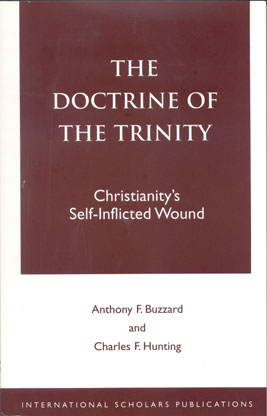 Doctrine of the Trinity: Christianity's Self-Inflicted Wound
Doctrine of the Trinity: Christianity's Self-Inflicted Wound
by Sir Anthony Buzzard
paperback, 365 pages
1998: University Press of America
This important work is a detailed biblical investigation of the relationship of Jesus to the one God of Israel. The authors challenge the notion that biblical monotheism is legitimately represented by a Trinitarian view of God and demonstrate that within the bounds of the canon of Scripture Jesus is confessed as Messiah, Son of God, but not God Himself. Later Christological developments beginning in the second century, and under the influence of pagan Gnosticism, misrepresented the biblical doctrine of God and Christ by altering the terms of the biblical presentation of the Father and the Son. This fateful development laid the foundation of a revised, unscriptural creed which needs to be challenged. This book provides a definitive presentation of a Christology rooted in the Hebrew Bible and the New Testament. The authors present a sharply-argued appeal for an understanding of God and Jesus in the context of Christianity's original, apostolic, unitary monotheism. Available for free online in Spanish, Czech, Polish, Italian, German (email request), Norwegian, and Russian. Click here to purchase (English only).
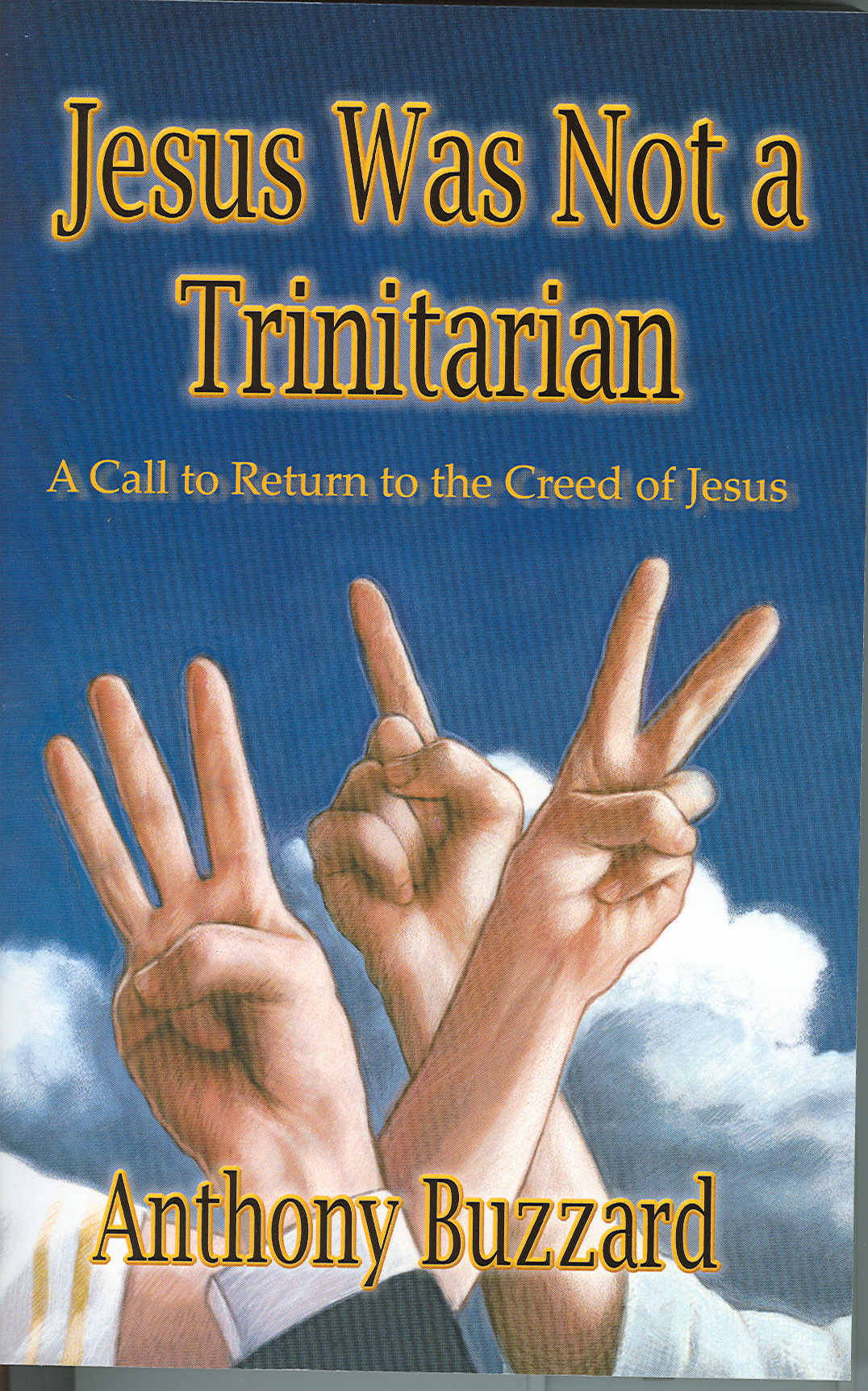 Jesus Was Not a Trinitarian
Jesus Was Not a Trinitarian
by Sir Anthony Buzzard
paperback, 465 pages
2007: Restoration Fellowship
There is a growing concern among evangelical scholars that evangelicalism, its doctrine of God and of the Gospel, may not be as securely rooted in Scripture as is often uncritically imagined. The accounts of the historical Jesus and his saving teaching, given us in three corroborating reports in Matthew, Mark and Luke, are often played down in favor of a set of verses from the letters of Paul. That "treadmill" of favorite evangelical proof-texts also relies heavily on John's Gospel. This unbalanced use of Scripture results in a distortion of Jesus' claim to be Messiah, Son of God, in relation to his Father whom he defined as "the only one who is truly God" (John 17:3).
The crux of the problem lies in this fact: Jesus' own very Jewish creed, which he affirmed as the most important truth of all in agreement with a Jewish scribe (Mark 12:28-34), has been allowed no voice in the traditional creeds recited in Church. Worse still, when the unitary monotheistic creed of Jesus and Paul is advanced as the necessary bedrock of good Christian thinking, its exponents are likely to be charged with upsetting the longstanding findings of the church councils. They are even made unwelcome in church settings.
Anthony Buzzard invites scholars and laymen alike to take seriously Jesus' Jewish creed, his recitation of the Shema, "Hear, O Israel," which proclaims God to be one single Lord. Defining God and His Son biblically remains part of the unfinished work of the Reformation. The evidence placed before the reader shows that a major paradigm shift is needed if Christians are to worship their God in spirit and in truth, uncluttered by the philosophical and confusing ideas of God which form part of received church tradition. Buzzard's thesis has enormous significance for the discussion among three great world religions -- Christianity, Judaism and Islam. Click here to purchase.
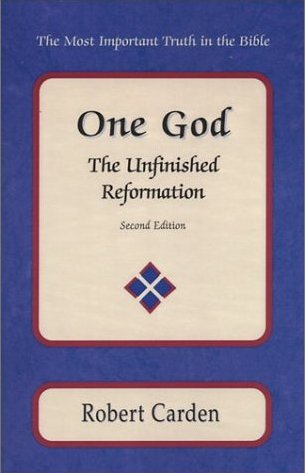 One God: The Unfinished Reformation
One God: The Unfinished Reformation
by Robert Carden
paperback, 262 pages
2003: Grace Christian Press
For almost 500 years the Reformation has endeavored to return Christianity to the Bible. It has examined almost every belief imaginable in a search for truth. Every belief except one: the nature of God Himself.
One God: The Unfinished Reformation takes you into the heart of God's Word to answer what should have been the first question of the Reformation: Who is God? The answer may surprise you, for the Bible says nothing of a Trinity, but firmly declares that there is only one God: the Father of Jesus Christ. Getting to know this one God is the most exciting quest any man or woman can ever undertake. Click here to purchase.
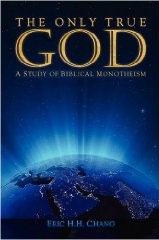 The Only True God
The Only True God
by Eric H. H. Chang
hardcover or paperback, 684 pages
2008: Xlibris Corporation
Monotheism--the belief in one and only God--is a cornerstone doctrine of the Christian faith. Yet seldom is this doctrine examined in the light of its Jewish roots and of God's revelation in the Scriptures. The lack of a precise, Biblically-rooted monotheism in Christianity has far-reaching consequences for our spiritual lives, even hindering our ability to obey--with single-minded totality--a command that Jesus stresses repeatedly: "You shall love the Lord your God with all your heart, with all your soul, with all your mind, and with all your strength."
When Jesus calls his Father "the only true God" in John 17:3, is he addressing his Father as one of the three Persons in the Godhead, or as one Person who alone is the only true God? What do the apostles teach us about the oneness of God? What do we make of John's astounding statement that the Word became flesh?
The Only True God addresses these and other questions with insight and clarity. In the spirit of sola Scriptura--Scripture as sole authority for doctrine--the author surveys the voluminous Biblical data on monotheism in the hope that they may be studied constructively. While the book contains much material for intellectual reflection, its ultimate concern is for what is truly at stake: spiritual life, eternal life, and the faith delivered once for all to the saints.
Read it online or purchase it: paperback or hardcover.
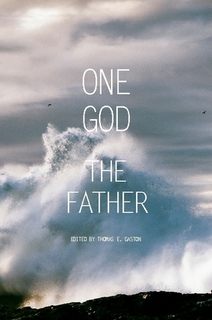 One God, the Father
One God, the Father
edited by Thomas E. Gaston
paperback, 311 pages
2013: Willow Productions
This book is a collection of 16 essays by various authors offering a defence of Biblical Monotheism. It presents a definition of 'monotheism' from the Jewish Scriptures and contrasts this with the trinitarian definition of God. It explores how the Old Testament presents Yahweh as 'one God'. It details how the Synoptics, the writings of John and Paul present the relationship of Israel's God to Jesus. It traces the development of church ideas about God showing how they then deviated from the Bible. It describes how thinkers and communities have preserved the truth of Biblical Monothesism down the ages. It concludes with essays discussing the atonement, and the issue of worship and prayer in relation to Jesus.
Purchase it here.
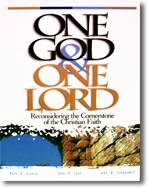 One God & One Lord: Reconsidering the Cornerstone of the Christian Faith
One God & One Lord: Reconsidering the Cornerstone of the Christian Faith
by Mark H. Graeser, John A. Lynn, John W. Schoenheit
hardcover, 680 pages
2000: Christian Educational Services
"Who do you say that I am?". Jesus of Nazareth posed this question to his followers nearly two thousand years ago, but the question still hangs in the air, requesting an answer from every person. Indeed, the question of the identity of Jesus Christ is the most important theological issue of all human history, because he claimed to be the human Son of the one true God. In this 680 page biblical research book, ONE GOD & ONE LORD, the authors carefully re-examine the biblical evidence in light of modern textual research and a thorough survey of scholarly opinion. They argue that the biblically accurate answer to the question of his identity is provided by Peter, John, Mary, Paul and other first-century believers who unanimously proclaimed him to be "the Christ, the Son of the living God."
Building an impressive and compelling case for the unity of the biblical testimony concerning the true humanity of Jesus, "the last Adam," the authors reveal the profound significance of the two aspects of his coming: suffering and glory. They seek a view of Christ that allows for a total appreciation of his steadfast obedience to God in the face of temptation, suffering and even a humiliating death. Vindicated by his resurrection, he entered into glory and now sits in a position of functional equality with God, analogous to the relationship of Joseph and Pharaoh in the Book of Genesis. ONE GOD & ONE LORD shows how the traditional view of Jesus Christ actually demeans both his accomplishments and his heroism by attributing to him "intrinsic deity" that essentially eliminates the possibility of either authentic temptation or failure.
Because the Gospel of John is often isolated and magnified to establish and fortify orthodox Christology, the authors explore in depth the unique depiction of Christ in "the Fourth Gospel". They succeed in placing John's testimony harmoniously and understandably within the margins of the prophetic portrait of the Messiah. This portrait had already been drawn out in detail in the Hebrew Scriptures and was then fleshed out in the Synoptic Gospels. Nowhere in this portrait is it clear that Messiah was "God incarnate," "God the Son," or a pre-existent divine visitor.
Appealing primarily to scriptural authority and logical reasoning, ONE GOD & ONE LORD also thoroughly examines the historical process by which traditional Christian orthodoxy came to be established. A combination of misguided Christian piety and pagan speculation are shown to be responsible for the intrusion of unbiblical concepts into basic Christian thought and doctrine.
ONE GOD & ONE LORD is challenging, but profoundly encourages both Christian devotion and a deep appreciation for the integrity of the Bible. It will reward the careful attention of the critic of Christianity, the new Christian, students of the Bible, pastors, teachers and scholars. Read excerpts online or click here to purchase.
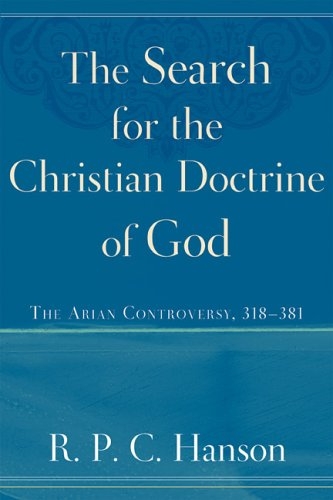 The Search for the Doctrine of God: The Arian Controversy, 318-381
The Search for the Doctrine of God: The Arian Controversy, 318-381
by R.P.C. Hanson
paperback, 960 pages
2006: Baker Academic
First published in 1988, The Search for the Christian Doctrine of God is still considered by many scholars to be the finest work on the Arian Controversy. Examining scholarly works on the Controversy and many original texts, Professor Hanson, provides a clear understanding of how the traditional and historic doctrine of God as the Holy Trinity reached its most mature and enduring form. The author is not primarily concerned to defend the orthodox position itself, but rather to discover and examine the formation of that orthodoxy. The history of the events - the Councils, the interventions of the Emperor, the rivalries of sees, the behaviour of bishops, the varying fortunes of the different schools of thought and their leaders - is interwoven with the progression of thought and doctrine during the sixty years of the Controversy. Click here to purchase.
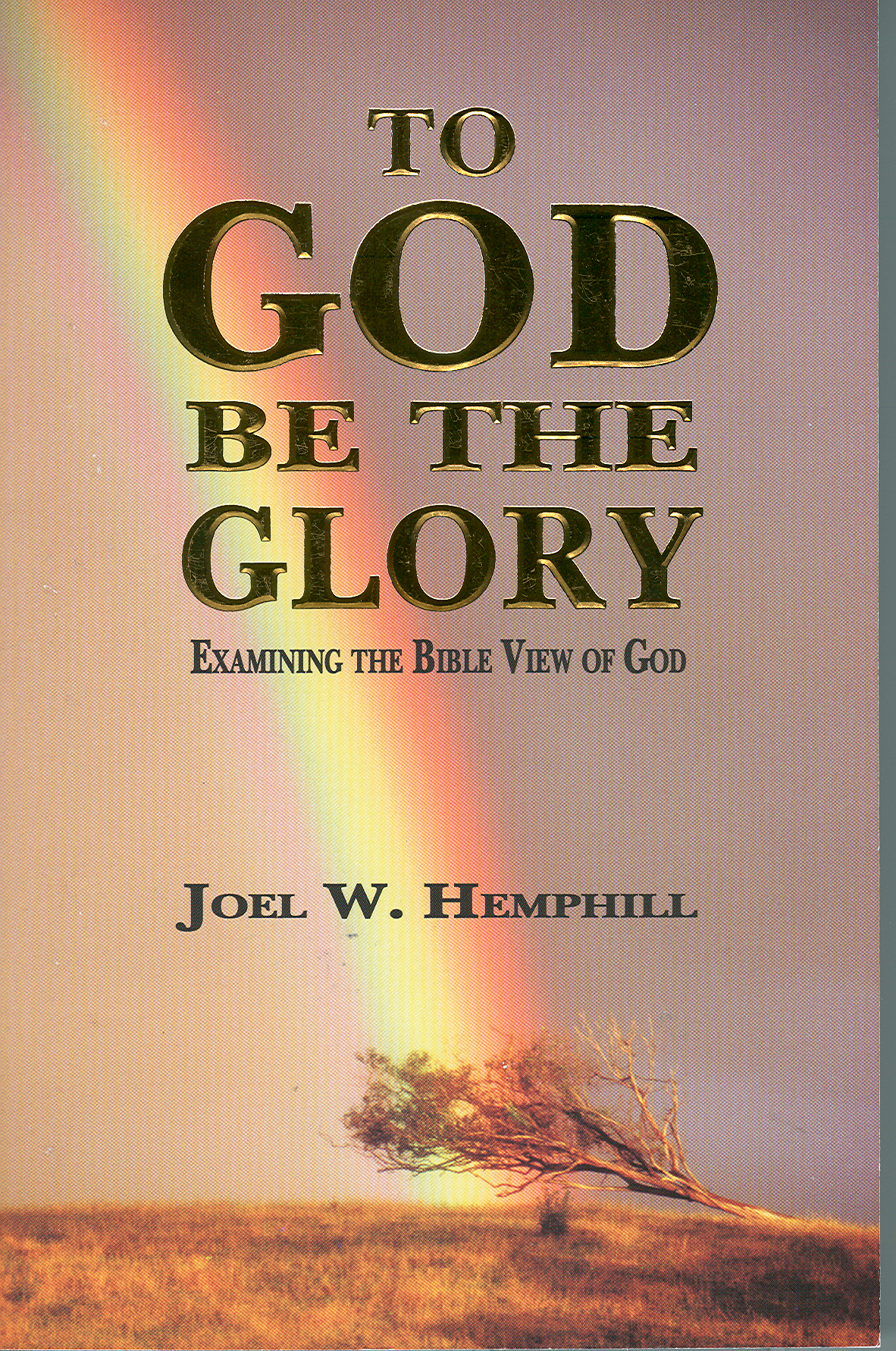 To God be the Glory
To God be the Glory
by Joel W. Hemphill
paperback, 390 pages
2006: Trumpet Call Books
In the spring of 1986 I had an awesome encounter with the God of Abraham, Isaac and Jacob. Along with many other things that He told me, He said for me to study the Scripture, as He was going to reveal Himself to me in His word. This seemed strange as I was forty-six years old, had been saved since I was ten, had been a minister of the Gospel since the age of nineteen, and thought I had a pretty good grasp on who He was. I was mistaken!
This book does not seek to diminish Jesus in any way. God forbid! Neither should it ever be used to try and do so. He is everything the Holy Bible says he is, the virgin born, righteous, anointed, appointed, approved Son of God, Messiah of Israel.
Finally, I have approached the subject of this writing carefully and prayerfully as its importance is too great to get it wrong. I have also kept in mind Jesus' words to Peter, "Feed my sheep" and "feed my lambs." These are of different maturity and need different food. Perhaps there are even a few goats. The challenge is to awaken the goats without harming the sheep and lambs. Only time will tell if I have succeeded. I love you all. Click here to purchase in English or German.
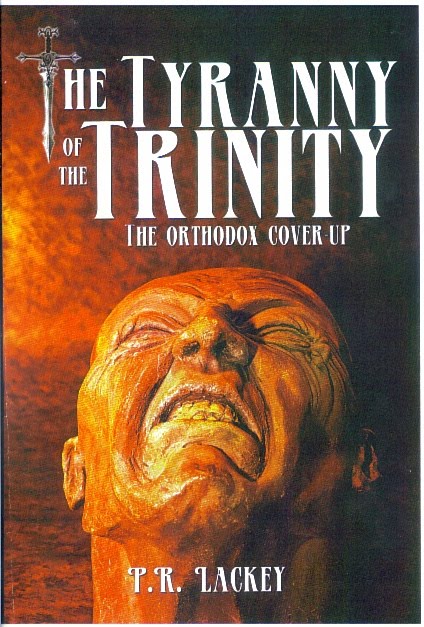 The Tyranny of the Trinity: The Orthodox Cover-up
The Tyranny of the Trinity: The Orthodox Cover-up
by P. R. Lackey
paperback, 360 pages
2008: AuthorHouse
The Tyranny of the Trinity lends a "Voice of Reason" to a biblically unsubstantiated doctrine. This book will afford readers a more fair and balanced approach to the Scriptures which have been so distorted by the mishandling and misinterpretations of clergy via thier creeds and doctrines. The conscientious truth-seeker will be given a perspective contrary to what they have perennially been taught primarily through tradition and generational adherence to a particular belief. Justice is only served when "all the facts" are known. A lie told long enough carries more weight the the truth; hence, the Trinity. The Trinity is perceived as a "mystery" even withn its own camp, but continues to remain the Cornerstone a of Christianity. Those who do not embace this doctine are considered heretics! This is the con job bequeathed on Judeo-Christianity by the early Church Fathers. Click here to purchase.
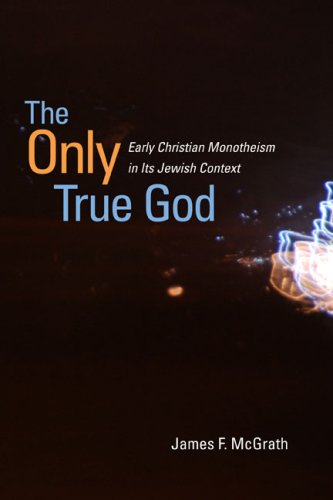 The Only True God: Early Christian Monotheism in Its Jewish Context
The Only True God: Early Christian Monotheism in Its Jewish Context
by James F. McGrath
paperback, 168 pages
2009: University of Illinois Press
Monotheism, the idea that there is only one true God, is a powerful religious concept that was shaped by competing ideas and the problems they raised. Surveying New Testament writings and Jewish sources from before and after the rise of Christianity, James F. McGrath argues that even the most developed Christologies in the New Testament fit within the context of first century Jewish "monotheism." In doing so, he pinpoints more precisely when the parting of ways took place over the issue of God's oneness, and he explores philosophical ideas such as "creation out of nothing," which caused Jews and Christians to develop differing concepts and definitions about God. Click here to purchase.
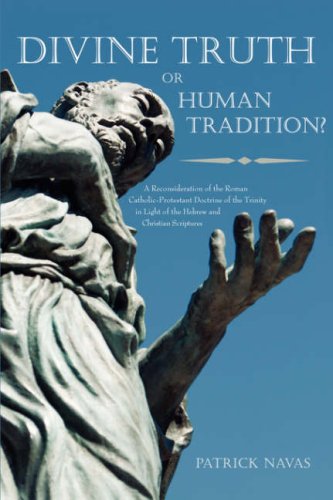 Divine Truth or Human Tradition?: A Reconsideration of the Roman Catholic-Protestant Doctrine of the Trinity in Light of the Hebrew and Christian Scriptures
Divine Truth or Human Tradition?: A Reconsideration of the Roman Catholic-Protestant Doctrine of the Trinity in Light of the Hebrew and Christian Scriptures
by Patrick Navas
paperback, 576 pages
2006: AuthorHouse
In Divine Truth or Human Tradition? the author examines the viewpoints and Scripture expositions of prominent evangelical scholars and apologists; including popular author and debater Dr. James R. White (author of The Forgotten Trinity), John MacArthur (President of The Master's Seminary), Wayne Grudem (author of the widely-read Systematic Theology), Robert Bowman Jr. (author of Why You Should Believe in the Trinity), Robert Morey (Founder of California Biblical University & Seminary and author of The Trinity, Evidence and Issues), R. C. Sproul (President of Ligonier Ministries), Robert L. Reymond (author of Jesus, Divine Messiah and A New Systematic Theology of the Christian Faith), and others.
According to what has long been considered mainstream Christian "orthodoxy," the doctrine of the Trinity (the idea that the one true God is--in the ultimate sense--a divine being made up of three co-equal and co-eternal persons) is not only central to the Christian faith, but absolutely necessary for one to accept in order to be counted as a true Christian and be saved. Such a demand on a Christian's faith has come across as strange and perplexing to many, especially so in light of the fact pointed out by one respected Trinitarian:
"[The Trinity] is not clearly or explicitly taught anywhere in Scripture, yet it is widely regarded as a central doctrine, indispensable to the Christian faith. In this regard, it goes contrary to what is virtually an axiom [that is, a given, a self-evident truth] of biblical doctrine, namely, that there is a direct correlation between the scriptural clarity of a doctrine and its cruciality to the faith and life of the church." (Millard J. Erickson, God in Three Persons, p. 11. Emphasis added)
Understandably, this fact has raised questions in the minds of Christians and truth-seekers alike ever since the doctrine was first decreed as mandatory to confess in the late 4th century. Many Christians have wondered: How can a doctrine that is not clearly or explicitly taught in the Bible be considered mandatory to accept in order to be a true practitioner of the Christian faith? Since it is not taught by Scripture in a straightforward way, is it possible that the doctrine of the Trinity is not an authentic representation of God's nature and of the original apostolic faith? Were the councils correct in decreeing that it is obligatory for Christians to accept the concept of the Trinity in order to be saved? Or, does such a pronouncement go beyond the original apostolic doctrine? Few Evangelical Christians have been willing to explore these issues in depth. Most are familiar with the arguments commonly advanced to defend the idea. But how many are familiar with alternative (yet scripturally harmonious) ways to understand the classic "proof-texts"? Surprisingly--as research has revealed--Trinitarians themselves provide most of the alternative answers. Click here to purchase.
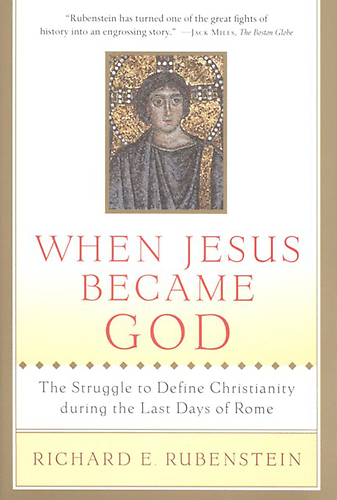 When Jesus Became God
When Jesus Became God
by Richard E. Rubenstein
hardcover or paperback, 288 pages
2000: Mariner Books
The Gospel narratives may suggest that Jesus was divine, but they do not insist upon it. Hundreds of years after Jesus' death, the Church councils made Jesus' divinity a central tenet of belief among many of his followers. When Jesus Became God: The Epic Fight over Christ's Divinity in the Last Days of Rome by Richard Rubenstein is a narrative history of Christians' early efforts to define Christianity by convening councils and writing creeds. Rubenstein is most interested in the battle between Arius, Presbyter of Alexandria, and Athanasius, Bishop of Alexandria. Arius said that Christ did not share God's nature but was the first creature God created. Athanasius said that Christ was fully God. At the Council of Nicea in 325, the Church Fathers came down on Athanasius's side and made Arius's belief a heresy.
Rubenstein's brisk, incisive prose brings the councils' 4th-century Roman setting fully alive, with riots, civil strife, and spectacular public debates. Rubenstein is also personally invested in the meaning of these councils for religious life today: he wrote this book, in part, because he grew up in a mixed Jewish Catholic neighborhood and was bewildered by animosity between the religious groups on his block. Digging back in history, Rubenstein learns that before the Arian controversy, "Jews and Christians could talk to each other and argue among themselves about crucial issues like the divinity of Jesus.... They disagreed strongly about many things, but there was still a closeness between them." But when the controversy was settled, Rubenstein notes, "that closeness faded. To Christians, God became a Trinity and heresy became a crime. Judaism became a form of infidelity. And Jews living in Christian countries learned not to think very much about Jesus and his message." (review by Michael Joseph Grossn taken from Amazon.com). Click here to purchase.
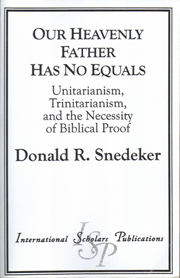 Our Heavenly Father Has No Equals: Unitarianism, Trinitarianism, and the Necessity of Biblical Proof
Our Heavenly Father Has No Equals: Unitarianism, Trinitarianism, and the Necessity of Biblical Proof
by Donald R. Snedeker
hardcover or paperback, 537 pages
1998: International Scholars Publications
"Our Heavenly Father Has No Equals" is a complete defense of the unitarian Christian understanding of the nature of God. Along the lines of Buzzard and Hunting's "The Doctrine of the Trinity: Christianity's Self-Inflicted Wound" in terms of style and content, it is a more thorough analysis with a chapter devoted to a verse-by-verse reply to Trinitarian claims. It is highly recommended for those who question the doctrine handed down to them by their denominational tradition. As in the case with Buzzard and Hunting, Donald R. Snedeker has provided an effective tool for the Radical Reformation-the recovery of apostolic doctrine as it was known in the first century. (review by J. Thomson taken from Amazon.com). Out of print (prices range from $75 to over $400). Click here to purchase.
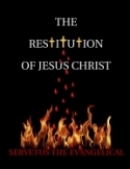 The Restitution of Jesus Christ
The Restitution of Jesus Christ
by Kermit Zarley, a.k.a. Servetus the Evangelical
wire-O, ~600 pages
2008: self published
The Restitution of Jesus Christ may be the most formidable, comprehensive, well-researched, biblically in-depth book to ever challenge the church dogma that Jesus is God. Yet it affirms all other major church teachings about Jesus, including his virgin birth, sinlessness, miracles, atonement, resurrection, ascension, heavenly exaltation, and future return to establish his earthly kingdom. This book is based on a conservative view of the inspiration of the Bible. So, it affirms the historical integrity of its four gospels. They tell almost all we know about Jesus of Nazareth.
The book begins with an Introduction. Chapters 2-3 provide 100 pages of the history of identity Christology (study of Jesus' identity). Chapter 4 is about the Old Testament and Judaism. The remainder of the book addresses mostly the exegesis of the major New Testament texts which have commonly been believed to support the view that Jesus was and is God. They include the following: John 1.1c, 18; 5.18; 10.30; 20.28; Romans 9.5; Philippians 2.6-11; 1 Timothy 2.5; 3.16; 2 Thessalonians 1.12; Titus 2.13; Hebrews 1.8-9; 2 Peter 1.1; 1 John 5.20. This material is arranged according to biblical authors. Therefore, chapters are titled "Christology of the Synoptists," "Christology of John," "Christology of Paul," etc. Click here to purchase.
 Who Is Jesus? A Plea for a Return to Belief in Jesus the Messiah
Who Is Jesus? A Plea for a Return to Belief in Jesus the Messiah
 Doctrine of the Trinity: Christianity's Self-Inflicted Wound
Doctrine of the Trinity: Christianity's Self-Inflicted Wound
 Jesus Was Not a Trinitarian
Jesus Was Not a Trinitarian
 One God: The Unfinished Reformation
One God: The Unfinished Reformation
 The Only True God
The Only True God
 One God, the Father
One God, the Father
 One God & One Lord: Reconsidering the Cornerstone of the Christian Faith
One God & One Lord: Reconsidering the Cornerstone of the Christian Faith
 The Search for the Doctrine of God: The Arian Controversy, 318-381
The Search for the Doctrine of God: The Arian Controversy, 318-381
 To God be the Glory
To God be the Glory
 The Tyranny of the Trinity: The Orthodox Cover-up
The Tyranny of the Trinity: The Orthodox Cover-up
 The Only True God: Early Christian Monotheism in Its Jewish Context
The Only True God: Early Christian Monotheism in Its Jewish Context
 Divine Truth or Human Tradition?: A Reconsideration of the Roman Catholic-Protestant Doctrine of the Trinity in Light of the Hebrew and Christian Scriptures
Divine Truth or Human Tradition?: A Reconsideration of the Roman Catholic-Protestant Doctrine of the Trinity in Light of the Hebrew and Christian Scriptures
 When Jesus Became God
When Jesus Became God
 Our Heavenly Father Has No Equals: Unitarianism, Trinitarianism, and the Necessity of Biblical Proof
Our Heavenly Father Has No Equals: Unitarianism, Trinitarianism, and the Necessity of Biblical Proof
 The Restitution of Jesus Christ
The Restitution of Jesus Christ